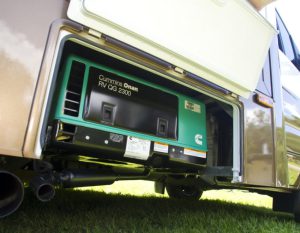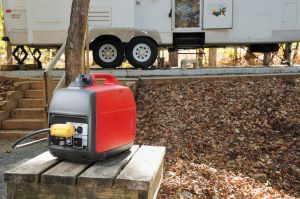Your RV is your home on wheels, your instant vacation, and your escape from the worries of everyday life. It’s also a complex piece of machinery. To get the most from your investment in a coach or trailer, it’s important to keep the power flowing.
If you always head to a campground or resort with power hookups, you may imagine that you don’t need an RV generator. But there’s no faster way to ruin a getaway than discovering that your reserved spot does not have what you need to plug in.
Some of you probably want to take RV trips to more remote locations that don’t have hookups.
Having a reliable RV generator gives you options and lets you design the RV lifestyle that you want.
RV Generator Types
Broadly speaking, there are two types of RV generators. You can choose one that’s built into your vehicle or a portable generator. Both have benefits and drawbacks.
Built-in RV Generators

Larger motorhomes and coaches may have space for a built-in RV generator. These generators run off the same fuel as your vehicle (diesel or gas). They’re integrated into your electrical system and are easy to turn on. They require no additional setup.
A built-in generator is also likely to be a powerful generator. Offering up to 12,000 watts of power, a big built-in generator can often power all your appliances and your air conditioner. It is also quieter than an external, portable unit.
A built-in generator runs not only off the same fuel as your RV, it draws that fuel from your tank. This eliminates the need for an extra tank and many of them will shut off at about a quarter of a tank so you won’t drain your fuel.
This sounds like a no-brainer, but built-in generators do have some drawbacks. They’re situated inside your vehicle so pose some risk of exhaust leaks. Generator exhaust contains carbon monoxide, a colorless, odorless gas that can be deadly.
You should always have good carbon monoxide detectors in your RV.
Built-in generators are much harder to service than portable generators. This makes sense since they’re inside the vehicle. Big built-ins are also more expensive.
Built-in generators are a great choice for larger Class A and Class C motorhomes with a suitable compartment. They can handle the greater energy needs of these big RVs and offer convenient backup or off-the-grid power.
Portable Generators

Portable generators come in all sizes. If your RV does not have a compartment for a built-in generator (this is true for travel trailers and 5th wheels as well as smaller and older motorhomes), a portable generator is your only choice.
A portable generator sits outside your motorhome or trailer while running, but needs to be stored onboard while you’re on the road. It needs to be set up and connected to a fuel source when you arrive.
The main variables for portable generators are fuel type and size.
Portable RV Generator Fuels
First, let’s take a look at how a portable generator for your RV is powered. There are three types.
- Propane. A propane generator uses liquid propane. It’s cheaper than gas and has a longer shelf life. It is generally considered to be relatively environmentally friendly compared to gas or diesel. Propane generators are a little quieter.
- Gas. Gas generators are popular because they use the same fuel as most RVs. Gas is easy to find but more expensive than propane, with a shorter shelf life. Gas generators can be pretty loud.
- Diesel. Diesel RV generators are convenient if your vehicle uses diesel fuel. Diesel burns slower than gas, which can offset the higher fuel cost. They tend to be louder than the other options.
Most people choose a portable RV generator that uses the same fuel as their vehicle out of convenience. There are lots of opinions on which fuel is best. In most instances, your choice will be dictated by a combination of the type of RV you have and your personal preference.
Portable Generator Size and Power
Portable generators come in sizes from very small (~150 watts) to very large (8,000+ watts) and everything in between. The first thing you need to do is figure out how much power you need your generator to produce.
How much power you need from your generator is not the same as how much power your RV is capable of using. Remember that you’re unlikely to turn on every light, use every appliance, and crank up the air conditioner all at the same time.
But if you want to have the ability to do that, plan accordingly. You can tally up the wattage of all the power-using components of your RV or use an electric meter to average your hourly use.
Some people don’t plan to use their generators in anything other than an emergency. If that’s you, you can probably get away with a smaller, lower-watt unit. Dry campers who only want to have a few lights in the evening have very different needs than RV those who want to bring their Class A coach to a remote area and keep the comforts of home.
It’s important to consider your neighbors
When using a portable generator it’s also important to consider your potential neighbors. Since these units sit outside your RV, any noise they make is shared with the whole neighborhood.
Generally, the larger the generator is, the louder the generator is. Do you need 8,000 watts just in case you lose power for a while at a campsite? Or can you cut down your energy use and get by with 3000 watts?
3,000 watts can usually power an air conditioner (beware of going below 3,000 if you want this capability), and maybe that’s all you need. What you decide in the end in terms of size and power is going to depend on what you need your generator to do.
Portable RV Generator Benefits
It might seem like a built-in RV generator is the best possible option. If your vehicle supports one, it often is the best option. But there are benefits to portable generators.
- You choose the size, power, and fuel
- They are generally less expensive
- Easier to service
- Can be used for other applications
Portable Generator Drawbacks
- Any size portable generator is going to make some noise
- Manual set up
- No automatic start
- Additional fuel tanks
- Need to be stowed during travel
The Clean Alternative
You should also consider the possibility of installing a solar generator. They consist of solar panels and a battery storage system that connects to an inverter. They don’t provide as much juice as a generator but can give an eco-friendly, silent boost to your power stores, especially if you’re off-grid.
A solar generator is more expensive to purchase and set up but has no fuel costs.
The Bottom Line
Many RV owners are going to want the peace of mind that comes with having an independent source of power. Whether it’s to camp in remote areas or as a backup if hookups fail, an RV generator is a worthwhile investment.
To choose the right one, make sure you know both your RV and your RV lifestyle.
Newer Class A or Class C motorhomes are likely to have a compartment for a built-in RV generator. Older models and trailers do not, so will require a portable generator.
Use either your math skills or an electric meter to figure out how much power you need per hour from your generator. You don’t want to buy a bigger, louder unit than you need. You also don’t want to be stuck without enough power for your RV lifestyle while on vacation.
Choose a generator that has a little more power than you need. This is a place to be generous in your estimates.
Also make sure that you purchase, install, and run your RV generator in accordance with EPA regulations. Protect the nature you enjoy and avoid a hefty fine by knowing and abiding by environmental rules.
Contact us at Leisure Coachworks to learn more about finding the perfect RV generator. Our experienced specialists and technicians will help you choose a generator that fits your vehicle, your power needs, and your RV lifestyle.
